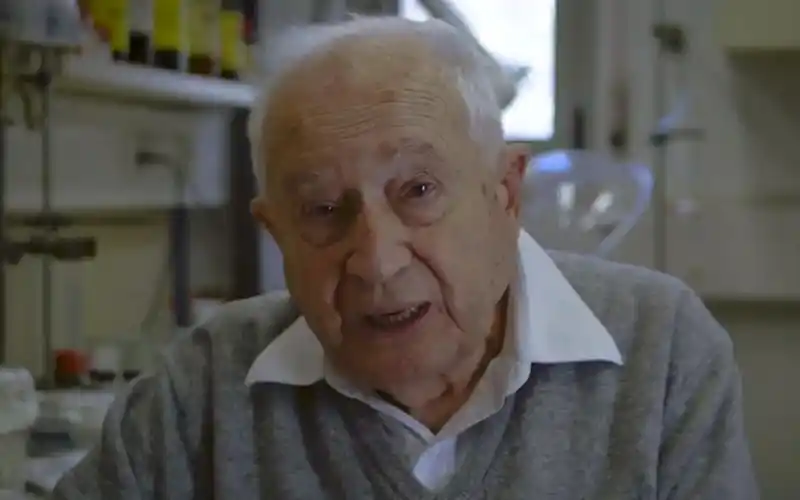Business
‘Father of Cannabis Science’ Raphael Mechoulam Dead at 92

You can thank Mechoulam for the discovery of THC.
Raphael Mechoulam, the first person to synthesize THC, earning him the moniker the “Father of Cannabis Science,” has died, Analytical Cannabis reports. He was 92 years old, and his legacy will most certainly live on for centuries to come. The esteemed chemist is also called the father of cannabis research. Some of his additional game-changing contributions to drug science include isolating and synthesizing other cannabinoids, such as cannabidiol (CBD), cannabigerol (CBG), and cannabichromene (CBC).
While THC, CBD, and CBG are basically household names today, that would not be the case if it weren’t for Dr. Mechoulam, so smoke one out for him in remembrance. A medicinal chemistry professor at the Hebrew University of Jerusalem in Israel, his work laid the groundwork and got the ball (or blunt) rolling to prompt future breakthroughs, such as illumination into the human body’s internal cannabinoid receptors in the 1980s and ’90s, as detailed in the 1993 academic paper titled Molecular characterization of a peripheral receptor for cannabinoids.
Make sure to pay your respects today, as Dr. Mechoulam’s friends and fellow scientists are, as you pass the peace pipe around with your buddies. “This is a very sad day for me, for the science community and for the cannabis community. Professor Raphael Mechoulam or as we called him Raphi, was one of the greatest scientist[s] I ever met and was my teacher and mentor in many aspects. I truly believe he [deserved] a Nobel prize!” wrote David “Dedi” Meiri, an associate professor at Technion, the Israel Institute of Technology, and one Mechoulam’s colleagues, in a touching online statement. “Thank you Raphi for all the great things you did and discover[ed] in your life and thanks for all the help and support you gave me. Rest in peace my dear friend,” he continues.
Born in Sofia, Bulgaria, in 1930, Mechoulam and his family relocated to Israel, where he began studying chemistry. His inspiration to start his successful hunt for THC began after wise observance of other drugs’ mechanisms. In an interview with CNN in 2014, Mechoulam pointed out that: “Morphine had been isolated from opium in the nineteenth century, early nineteenth century, cocaine had been isolated from coca leaves [in the] mid-nineteenth century. And here we were, mid-twentieth century, and yet the chemistry of cannabis was not known. So it looked like [an] interesting project.” According to the National Library of Medicine, in 1964, he succeeded. And the story behind how Mechoulam obtained the cannabis he studied may surprise you.
While working as a chemist in the early 1960s at the Weizmann Institute, Mechoulam got some weed from the Israeli police with his goal already in place: to discover and isolate what makes pot psychoactive. Once THC and other cannabinoids, such as the aforementioned CBD and CBG, were identified, in 1992, Mechoulam and his team discovered the chemical arachidonoyl ethanolamine, which you know as anandamide (derived from the Sanskrit word ananda, which means bliss). Anandamide is something our body’s endocannabinoid system produces on its own (as if we are built to use cannabis) and activates the CB1 receptor.
Deeply passionate and hardworking, Mechoulam continued his research right up to his death. At the age of 88, at the cannabis conference CannMed in California in 2019, he announced another breakthrough, synthetically stable cannabidiolic acid (CBDA), the main phytocannabinoid in fiber and seed-oil hemp, which contains anti-inflammatory, anti-convulsant, and anti-cancerogenic properties, and that’s likely just the tip of the iceberg. “We have taken the unstable acid molecules of the cannabis plant and synthesized them to provide a stable, consistent basis for researching new therapies across a wide range of medical needs,” Mechoulam explained at the conference. He also used his stage time to encourage the scientific community to invest more into cannabis research, as enough time has already been lost, citing the many people from the past who would have vastly benefited from medicinal cannabis should it have been available. “Did we have to wait 30 years? No,” he said. “We could have helped thousands of children, and we didn’t.”
Rest in Power, Dr. Mechoulam, and may everyone lucky enough to have access to the results of his work enjoy the power of plant medicine today.
Source: https://hightimes.com/news/father-of-cannabis-science-raphael-mechoulam-dead-at-92/
Business
New Mexico cannabis operator fined, loses license for alleged BioTrack fraud

New Mexico regulators fined a cannabis operator nearly $300,000 and revoked its license after the company allegedly created fake reports in the state’s traceability software.
The New Mexico Cannabis Control Division (CCD) accused marijuana manufacturer and retailer Golden Roots of 11 violations, according to Albuquerque Business First.
Golden Roots operates the The Cannabis Revolution Dispensary.
The majority of the violations are related to the Albuquerque company’s improper use of BioTrack, which has been New Mexico’s track-and-trace vendor since 2015.
The CCD alleges Golden Roots reported marijuana production only two months after it had received its vertically integrated license, according to Albuquerque Business First.
Because cannabis takes longer than two months to be cultivated, the CCD was suspicious of the report.
After inspecting the company’s premises, the CCD alleged Golden Roots reported cultivation, transportation and sales in BioTrack but wasn’t able to provide officers who inspected the site evidence that the operator was cultivating cannabis.
In April, the CCD revoked Golden Roots’ license and issued a $10,000 fine, according to the news outlet.
The company requested a hearing, which the regulator scheduled for Sept. 1.
At the hearing, the CCD testified that the company’s dried-cannabis weights in BioTrack were suspicious because they didn’t seem to accurately reflect how much weight marijuana loses as it dries.
Company employees also poorly accounted for why they were making adjustments in the system of up to 24 pounds of cannabis, making comments such as “bad” or “mistake” in the software, Albuquerque Business First reported.
Golden Roots was fined $298,972.05 – the amount regulators allege the company made selling products that weren’t properly accounted for in BioTrack.
The CCD has been cracking down on cannabis operators accused of selling products procured from out-of-state or not grown legally:
- Regulators alleged in August that Albuquerque dispensary Sawmill Sweet Leaf sold out-of-state products and didn’t have a license for extraction.
- Paradise Exotics Distro lost its license in July after regulators alleged the company sold products made in California.
Golden Roots was the first alleged rulebreaker in New Mexico to be asked to pay a large fine.
Source: https://mjbizdaily.com/new-mexico-cannabis-operator-fined-loses-license-for-alleged-biotrack-fraud/
Business
Marijuana companies suing US attorney general in federal prohibition challenge

Four marijuana companies, including a multistate operator, have filed a lawsuit against U.S. Attorney General Merrick Garland in which they allege the federal MJ prohibition under the Controlled Substances Act is no longer constitutional.
According to the complaint, filed Thursday in U.S. District Court in Massachusetts, retailer Canna Provisions, Treevit delivery service CEO Gyasi Sellers, cultivator Wiseacre Farm and MSO Verano Holdings Corp. are all harmed by “the federal government’s unconstitutional ban on cultivating, manufacturing, distributing, or possessing intrastate marijuana.”
Verano is headquartered in Chicago but has operations in Massachusetts; the other three operators are based in Massachusetts.
The lawsuit seeks a ruling that the “Controlled Substances Act is unconstitutional as applied to the intrastate cultivation, manufacture, possession, and distribution of marijuana pursuant to state law.”
The companies want the case to go before the U.S. Supreme Court.
They hired prominent law firm Boies Schiller Flexner to represent them.
The New York-based firm’s principal is David Boies, whose former clients include Microsoft, former presidential candidate Al Gore and Elizabeth Holmes’ disgraced startup Theranos.
Similar challenges to the federal Controlled Substances Act (CSA) have failed.
One such challenge led to a landmark Supreme Court decision in 2005.
In Gonzalez vs. Raich, the highest court in the United States ruled in a 6-3 decision that the commerce clause of the U.S. Constitution gave Congress the power to outlaw marijuana federally, even though state laws allow the cultivation and sale of cannabis.
In the 18 years since that ruling, 23 states and the District of Columbia have legalized adult-use marijuana and the federal government has allowed a multibillion-dollar cannabis industry to thrive.
Since both Congress and the U.S. Department of Justice, currently headed by Garland, have declined to intervene in state-licensed marijuana markets, the key facts that led to the Supreme Court’s 2005 ruling “no longer apply,” Boies said in a statement Thursday.
“The Supreme Court has since made clear that the federal government lacks the authority to regulate purely intrastate commerce,” Boies said.
“Moreover, the facts on which those precedents are based are no longer true.”
Verano President Darren Weiss said in a statement the company is “prepared to bring this case all the way to the Supreme Court in order to align federal law with how Congress has acted for years.”
While the Biden administration’s push to reschedule marijuana would help solve marijuana operators’ federal tax woes, neither rescheduling nor modest Congressional reforms such as the SAFER Banking Act “solve the fundamental issue,” Weiss added.
“The application of the CSA to lawful state-run cannabis business is an unconstitutional overreach on state sovereignty that has led to decades of harm, failed businesses, lost jobs, and unsafe working conditions.”
Business
Alabama to make another attempt Dec. 1 to award medical cannabis licenses

Alabama regulators are targeting Dec. 1 to award the first batch of medical cannabis business licenses after the agency’s first two attempts were scrapped because of scoring errors and litigation.
The first licenses will be awarded to individual cultivators, delivery providers, processors, dispensaries and state testing labs, according to the Alabama Medical Cannabis Commission (AMCC).
Then, on Dec. 12, the AMCC will award licenses for vertically integrated operations, a designation set primarily for multistate operators.
Licenses are expected to be handed out 28 days after they have been awarded, so MMJ production could begin in early January, according to the Alabama Daily News.
That means MMJ products could be available for patients around early March, an AMCC spokesperson told the media outlet.
Regulators initially awarded 21 business licenses in June, only to void them after applicants alleged inconsistencies with how the applications were scored.
Then, in August, the state awarded 24 different licenses – 19 went to June recipients – only to reverse themselves again and scratch those licenses after spurned applicants filed lawsuits.
A state judge dismissed a lawsuit filed by Chicago-based MSO Verano Holdings Corp., but another lawsuit is pending.
Source: https://mjbizdaily.com/alabama-plans-to-award-medical-cannabis-licenses-dec-1/
-

 Business2 years ago
Business2 years agoPot Odor Does Not Justify Probable Cause for Vehicle Searches, Minnesota Court Affirms
-

 Business2 years ago
Business2 years agoNew Mexico cannabis operator fined, loses license for alleged BioTrack fraud
-

 Business2 years ago
Business2 years agoAlabama to make another attempt Dec. 1 to award medical cannabis licenses
-

 Business2 years ago
Business2 years agoWashington State Pays Out $9.4 Million in Refunds Relating to Drug Convictions
-

 Business2 years ago
Business2 years agoMarijuana companies suing US attorney general in federal prohibition challenge
-

 Business2 years ago
Business2 years agoLegal Marijuana Handed A Nothing Burger From NY State
-

 Business2 years ago
Business2 years agoCan Cannabis Help Seasonal Depression
-

 Blogs2 years ago
Blogs2 years agoCannabis Art Is Flourishing On Etsy













